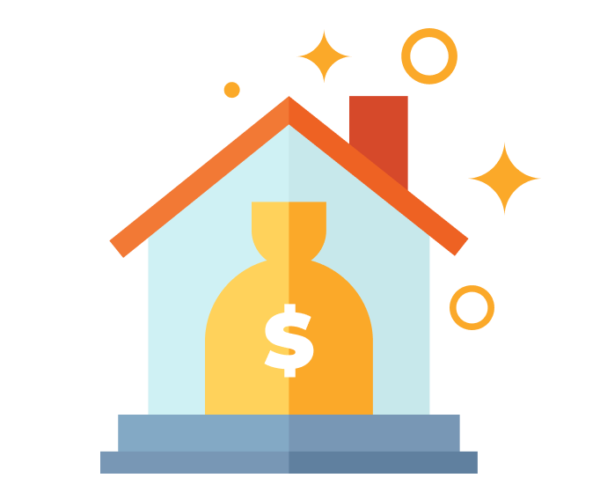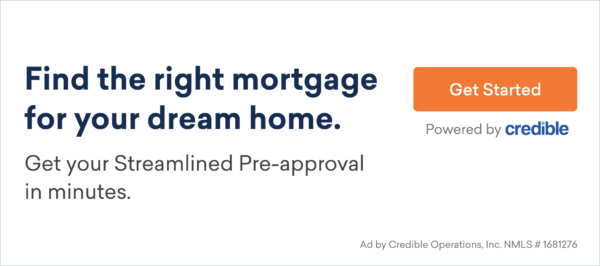Our goal is to give you the tools and confidence you need to improve your finances. Although we receive compensation from our partner lenders, whom we will always identify, all opinions are our own. Credible Operations, Inc. NMLS # 1681276, is referred to here as "Credible."
Credible Operations, Inc. NMLS# 1681276, “Credible.” Not available in all states. www.nmlsconsumeraccess.org.
When you’re in the market for a home loan, you have a lot of options, including FHA loans and conventional loans. Each loan type has its advantages and disadvantages. The right one for you depends on several factors, including your needs, financial situation, and credit score.
Let’s take a look at conventional loans vs. FHA loans to help you choose.
What’s a conventional loan?
A conventional loan is a mortgage that’s not guaranteed by a government agency. Conventional loans can either be conforming — meaning it follows Fannie Mae and Freddie Mac rules, even though it’s not federally backed — or nonconforming.
Banks, credit unions, and other private lenders originate conventional loans and can sell conforming loans to Fannie Mae or Freddie Mac to free up funds to make more loans. Nonconforming loans can’t be sold to Fannie Mae or Freddie Mac but may be sold to another lender.
What’s an FHA loan?
The Federal Housing Administration (FHA), a part of the U.S. Department of Housing and Urban Development (HUD), insures FHA loans. Banks, credit unions, and other private lenders provide FHA loans, and the FHA guarantees it will repay the loan if the borrower stops making payments.
This guarantee means financial institutions are willing to provide mortgages to buyers who may not qualify for a conventional loan because they have a low credit score or a lot of debt.
Credible makes it easy to compare mortgage rates from multiple lenders.
Conventional loans vs. FHA: How they differ
Conventional loans and FHA loans are both popular options for borrowers who want to buy a home or refinance their existing mortgage, but they differ in six key ways:
Credit score requirements
When you apply for a mortgage, the lender pulls your credit. There are several different versions of your credit score, but many lenders use the FICO scoring model. Your FICO Score ranges from 300 to 850. Many lenders consider a credit score above 670 to be “good,” according to myFICO.
Having a good credit score can make it easier to qualify for a mortgage because it signals to the lender that you’re more likely to repay your loan on time.
Conventional and FHA loans have different minimum score requirements:
- Conventional: 620
- FHA: 500
Down payment requirement
A down payment is an up-front payment of a percentage of the home’s purchase price. Lenders view a down payment as evidence that you’re committed to buying the home and less likely to default on your mortgage. And sellers may view a down payment as confirmation you’re committed to buying their home.
Minimum down payment:
- Conventional: 3%
- FHA: 3.5%
Debt-to-income ratio
Your debt-to-income (DTI) ratio compares how much you owe versus how much you earn. Lenders calculate your DTI by taking your total monthly payments toward debt (including your mortgage) and dividing it by your gross income.
Lenders use your DTI ratio to help determine the risk of loaning you money. Generally, the higher your DTI, the greater the possibility that you’ll run into trouble paying your bills. Both conventional and FHA lenders set maximum limits for DTI.
Maximum DTI:
- Conventional: 36% (borrowers with higher credit scores and larger down payments may be eligible with a DTI as high as 45%)
- FHA: 43% (borrowers with higher credit scores and strong cash reserves may qualify with a DTI as high as 50%)
Loan limits
Conforming conventional loans and FHA loans have loan limits — a dollar cap on the amount they can lend. Loan limits are set each year to reflect U.S. home prices.
2021 limits for a single-family home:
- Conventional loan limit: $548,250 (certain designated high-cost areas have higher limits)
- FHA loan limit: $822,375 (some areas have lower limits based on the average home price in that area)
Property standards
Homebuyers spend a lot of time thinking about whether they qualify for a mortgage, but the home you want to buy has to qualify for the mortgage, too.
Fannie Mae requires properties financed by conventional mortgages to be:
- A residential property with no more than four units
- Located in the U.S., Puerto Rico, U.S. Virgin Islands, or Guam
- Legally considered a home
- Safe, sound, and structurally secure
- Adequately covered by property and flood insurance
- Accessible from roads that meet local standards
- Equipped with and served by utilities that meet community standards
- Suitable for living there year-round
HUD requires all properties financed by FHA loans to undergo an inspection by an FHA-approved appraiser. The factors the appraiser considers during the inspection are extensive and include things like:
- Power lines don’t cross directly over the home, pool, or other water feature.
- Pedestrians and vehicles can safely access the property.
- There aren’t any hazards or nuisances on the property.
- Any swimming pools on the property must conform with local ordinances.
- The structure can be expected to last the life of the mortgage.
- The property has access to water, sewer, electricity, and other necessary utilities.
- Termites or other insects don’t infest the property.
Private mortgage insurance
Conventional loans require borrowers who put less than 20% down to pay private mortgage insurance (PMI). PMI protects the lender if you stop making mortgage payments.
The cost of PMI varies, but according to Freddie Mac, it’s generally between $30 and $150 for every $100,000 you borrow on a conventional loan.
FHA loans require borrowers to pay an up-front and annual mortgage insurance premium (MIP) regardless of the size of their down payment. The up-front MIP is 1.75% of the loan amount. The annual MIP varies from 0.45% to 1.05% of the loan amount, depending on the amount borrowed, down payment, and loan term.
Conventional loan vs. FHA: Pros and cons of each
Like any financial product, FHA and conventional mortgages have their pros and cons. When considering what type of mortgage to use, weigh the following factors carefully.
Pros of conventional loans
- Down payments as low as 3%
- Can avoid PMI with a 20% down payment
- Typically require less paperwork than government-backed loans
Cons of conventional loans
- Higher credit score requirements than government-backed loans
- Lower DTI requirements than FHA loans
- Borrowers can’t roll closing costs into the loan
Pros of FHA loans
- Down payments as low as 3.5%
- Available to borrowers with lower credit scores
- Higher DTI ratio allowed
Cons of FHA loans
- Rigorous inspection and appraisal standards mean it’s not a good option for fixer-uppers
- Available only on a primary residence, not vacation homes or investment properties
- Mortgage insurance required no matter how much you put down
Comparing rates and lenders can help ensure you get a competitive rate. You can learn about multiple lenders through Credible.
How can I qualify for a conventional loan or FHA mortgage?
Whichever home loan you choose, there’s a process for applying for and qualifying for a mortgage.
Qualifying for a conventional loan
- Gather documentation. Before you apply for a mortgage, gather the required documents. While the exact documents you need vary from lender to lender, you’ll likely need your recent pay stubs, W-2s, tax returns, bank and loan statements, and proof of any other income.
- Apply. Many banks and mortgage lenders allow you to begin the mortgage application process online. Get three or four quotes from different lenders on the same day to ensure you’re getting the best interest rate and terms. You may have to pay a small up-front fee — usually no more than $20 — to cover a credit check.
- Choose a loan offer. Once you’ve selected an offer, contact the lender to let them know you want to move forward. To finalize your loan, the lender may ask for more documentation supporting your income, DTI ratio, and cash reserves. Respond to any questions promptly to keep your application moving along. The lender may also order an appraisal and give you the option of ordering an inspection.
- Close on your home. Three business days before closing on your mortgage, you should receive a final Closing Disclosure. Review it carefully to ensure the rate, closing costs, and other loan terms are what you agreed to. Your lender and agent will schedule a final walk-through and closing, where you’ll pay the closing costs and sign the paperwork.
Qualifying for an FHA loan
- Gather documentation. You’ll need pay stubs, W-2s, tax returns, bank and loan statements, and proof of any other sources of income.
- Find an FHA-approved lender. Use HUD’s Lender List Search tool to find an FHA lender in your area. Contact three or four lenders to make sure you’re getting the best deal.
- Choose a loan offer. Once you’ve selected an offer, contact the lender to let them know you want to move forward. The lender may ask for more documentation supporting your income, DTI ratio, and cash reserves. You may also want to get a home inspection.
- Get an appraisal. The lender will schedule an appraisal to ensure the property meets FHA requirements and confirm the home’s value. If the appraiser determines that the home is worth less than you’ve agreed to pay, you will need to negotiate a lower price with the seller, pay the difference out of pocket, or find a different loan.
- Close on your home. Review the rate and other loan terms included in the final Closing Disclosure, and attend the final walk-through. Sign a slew of paperwork and pay your closing costs, and you’ll receive keys to your new home.
You can use Credible to compare mortgage rates and learn about lenders.
About the author: Janet Berry-Johnson is an authority on income taxes and small business accounting. She was a CPA for over 12 years and has been a personal finance writer for more than five years. Janet has written for several well-known media outlets, including The New York Times, Forbes, and Business Insider. In 2021, Canopy named her one of the Top 10 Influential Women in Accounting and Tax.
Janet received her bachelor’s degree in accounting from Morrison University and her CPA license from the State of Nevada in 2009. You can find her on Twitter or on LinkedIn.



